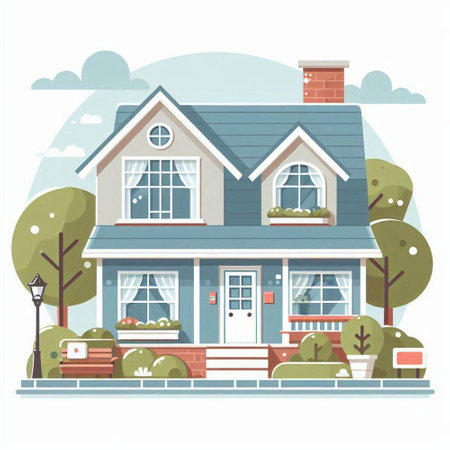1. What Are Closing Costs?
If youre buying your first home, youve probably heard the term “closing costs” thrown around — but what exactly are they? Simply put, closing costs are the fees and expenses you need to pay when finalizing a real estate transaction. These costs come on top of your down payment and can catch many first-time buyers off guard if they’re not prepared.
Why Do Closing Costs Exist?
When you buy a home, there are a lot of moving parts — from securing a mortgage to transferring property ownership. Closing costs cover all the services needed to make that happen smoothly. These fees go to different parties involved in the process, such as your lender, title company, appraisers, and local government agencies.
How Much Are Closing Costs?
On average, closing costs usually range from 2% to 5% of the homes purchase price. For example, if youre buying a $300,000 home, you might pay between $6,000 and $15,000 in closing costs. The exact amount depends on several factors like your loan type, location, and service providers.
Estimated Closing Costs Based on Home Price
| Home Purchase Price | Estimated Closing Costs (2%) | Estimated Closing Costs (5%) |
|---|---|---|
| $200,000 | $4,000 | $10,000 |
| $300,000 | $6,000 | $15,000 |
| $400,000 | $8,000 | $20,000 |
| $500,000 | $10,000 | $25,000 |
Who Pays for Closing Costs?
The buyer typically pays most of the closing costs, but sometimes sellers may agree to cover part of them during negotiations. This is especially true in a buyer’s market where sellers are more motivated. Always review your Loan Estimate and Closing Disclosure forms carefully — these documents break down every cost so you can see where your money is going.
A Quick Look at Common Closing Cost Items:
| Description | Who Typically Pays |
|---|---|
| Lender Fees (application fee, underwriting) | Buyer |
| Appraisal Fee | Buyer |
| Title Search & Title Insurance | Buyer (optional seller contribution) |
| Home Inspection (optional but recommended) | Buyer |
| Recording Fees & Transfer Taxes | Buyer or Seller depending on local customs |
| Attorney Fees (if applicable) | Buyer or Seller depending on state law |
| Prepaid Property Taxes & Homeowners Insurance | Buyer |
This overview helps set the stage for understanding what closing costs are and why they matter. As we go deeper into each category in later sections, youll get a clearer idea of how to plan ahead — so those hidden fees won’t be such a surprise when it’s time to sign on the dotted line.
2. Common Types of Closing Fees
When youre buying your first home, it’s easy to get caught off guard by the many fees that show up at closing. These fees, often called “closing costs,” are part of nearly every real estate transaction and can add up to thousands of dollars. To help you understand where your money is going, here’s a breakdown of the most common types of closing fees, who charges them, and why they exist.
Loan Origination Fee
This fee is charged by your mortgage lender for processing your loan application. It covers administrative costs such as underwriting and preparing loan documents. Typically, it ranges from 0.5% to 1% of the total loan amount.
Who Charges This?
Your mortgage lender or bank.
Why It’s Charged
To cover the cost of evaluating your financial background, credit history, and preparing your mortgage paperwork.
Title Insurance
Title insurance protects both you and your lender in case there are legal issues with the ownership of the home—like an undiscovered lien or a claim from a previous owner. There are usually two policies: one for the lender (required) and one for the buyer (optional but recommended).
Who Charges This?
A title company or sometimes an attorney handling the closing.
Why It’s Charged
To ensure there are no disputes over property ownership after purchase.
Appraisal Fee
An appraisal determines the market value of the home you’re buying. Lenders require this to make sure the property is worth what you’ve agreed to pay—and what they’re lending you.
Who Charges This?
An independent licensed appraiser contracted by your lender.
Why It’s Charged
To protect the lender from lending more than the home is actually worth.
Escrow Fees
Escrow fees cover the cost of having a neutral third party manage funds during the transaction. They handle everything from earnest money deposits to final payments on closing day.
Who Charges This?
The escrow company or attorney managing the closing process.
Why It’s Charged
To ensure all parties fulfill their obligations before money and property officially change hands.
Typical Closing Fees Breakdown
| Fee Type | Who Charges It | Approximate Cost | Purpose |
|---|---|---|---|
| Loan Origination Fee | Lender | 0.5% – 1% of loan amount | Covers processing and underwriting loan paperwork |
| Title Insurance (Lenders Policy) | Title Company | $500 – $1,000+ | Covers lender against ownership disputes |
| Title Insurance (Owners Policy) | Title Company | $300 – $800+ | Covers buyer against future title claims (optional but recommended) |
| Appraisal Fee | Lender/Appraiser | $300 – $700 | Determines fair market value of home |
| Escrow Fees | Escrow Company/Attorney | $500 – $2,000+ | Covers managing funds and paperwork during closing process |
The exact costs can vary depending on your location, lender, and type of property youre buying. Always ask for a Loan Estimate early in the process—it will give you a detailed preview of these fees so you can plan ahead.

3. Who Pays for What?
When it comes to closing costs, one of the most common questions first-time buyers ask is: “Who pays for what?” The answer can vary depending on your location and how negotiations go during the home buying process. However, there are some general guidelines that can help you understand what to expect.
Typical Buyer-Paid Closing Costs
In most cases, the buyer is responsible for the majority of closing costs. These fees are tied to securing the mortgage and transferring ownership of the property. Heres a breakdown of common costs typically paid by the buyer:
| Cost | Description |
|---|---|
| Loan Origination Fee | Charged by the lender for processing your loan application. |
| Appraisal Fee | Pays for a professional evaluation of the homes market value. |
| Home Inspection Fee | Covers the cost of inspecting the property for issues or defects. |
| Title Insurance (Lenders) | Protects the lender from title issues that may arise after purchase. |
| Prepaid Taxes and Insurance | You may need to prepay property taxes and homeowners insurance into an escrow account. |
| Recording Fees | Fees charged by your local government to officially record the property purchase. |
Typical Seller-Paid Closing Costs
Sellers also have their share of responsibilities when it comes to closing costs. These usually include items related to transferring ownership and paying off existing obligations tied to the property:
| Cost | Description |
|---|---|
| Real Estate Agent Commission | Usually 5-6% of the sale price, split between buyer’s and seller’s agents. |
| Title Insurance (Owners) | Covers the buyer in case title issues arise post-sale (varies by state). |
| Transfer Taxes | A tax imposed by state or local governments on property transfers. |
| Outstanding Property Taxes or HOA Fees | The seller must settle any unpaid dues before closing. |
| Attorney Fees (in some states) | If required, sellers may need legal representation at closing. |
Variations by State and Negotiation
The division of closing costs isnt set in stone. Depending on where youre buying, state laws and customs might shift certain fees between buyer and seller. For example, in some states like Florida or California, sellers often pay for owners title insurance, while in others, this might fall to the buyer. Additionally, during negotiations, buyers can request that sellers cover some or all of their closing costs—especially in a buyer’s market where sellers are more motivated.
Example: Negotiated Closing Cost Assistance
| Scenario | Description |
|---|---|
| Seller Concession | The seller agrees to pay $5,000 toward buyer’s closing costs as part of the purchase agreement. |
| Lender Credit Option | The lender covers part of your closing costs in exchange for a slightly higher interest rate. |
Key Takeaway for Buyers
If youre preparing to buy your first home, its important to talk with your real estate agent and lender early in the process about expected closing costs and who traditionally pays what in your area. Understanding this can help you budget properly—and even save money through smart negotiation.
4. How Much Should You Budget?
When youre buying a home for the first time, its easy to focus on the down payment and forget about closing costs. But these fees can add up fast—and if youre not prepared, they can throw off your budget at the last minute. Understanding how much to set aside for closing costs will help you avoid surprises and feel more confident when its time to sign the final paperwork.
Typical Closing Cost Range
Closing costs usually range from 2% to 5% of the homes purchase price. The percentage depends on your location, lender, loan type, and other factors like property taxes or HOA fees. Here’s a quick breakdown based on different home prices:
| Home Purchase Price | Estimated Closing Costs (2%) | Estimated Closing Costs (5%) |
|---|---|---|
| $250,000 | $5,000 | $12,500 |
| $350,000 | $7,000 | $17,500 |
| $500,000 | $10,000 | $25,000 |
What’s Included in Closing Costs?
Your closing costs might include:
- Lender fees (loan origination, application)
- Title insurance and title search fees
- Appraisal and home inspection fees
- Escrow deposits for taxes and insurance
- Recording fees and transfer taxes
Some of these costs are negotiable or may be covered by the seller in certain cases. Your lender is required to give you a Loan Estimate early in the process that outlines these charges.
Budgeting Tips for First-Time Buyers
- Start early: As soon as you start house hunting, begin setting aside money specifically for closing costs.
- Use online calculators: Many real estate websites offer free tools to estimate your potential closing costs based on your target home price and location.
- Ask your lender for estimates: Your mortgage lender can give you a ballpark figure during pre-approval.
- Cushion your savings: Plan to save at least 5% of your home price just in case—its better to have extra than fall short.
Planning ahead for closing costs means youll walk into the closing table informed and ready. It’s one more way to make your first home-buying experience smoother and less stressful.
5. How to Reduce Your Closing Costs
Closing costs can quickly add up, especially for first-time homebuyers who may not be prepared for all the extra fees. The good news is, there are several strategies you can use to help reduce these expenses and keep more money in your pocket.
Lender Credits
One way to lower your upfront closing costs is by asking your lender about lender credits. This means the lender will cover a portion of your closing costs in exchange for a slightly higher interest rate on your mortgage. It’s a trade-off, but if youre short on cash now and plan to stay in the home only for a few years, this could work in your favor.
Pros and Cons of Lender Credits
| Pros | Cons |
|---|---|
| Lower upfront costs | Youll pay more over time due to higher interest rates |
| No need to pay some fees out-of-pocket at closing | Might not be ideal for long-term homeowners |
Shop Around for Services
You’re not locked into using the service providers recommended by your real estate agent or lender. You can—and should—shop around for services like title insurance, home inspections, and even homeowner’s insurance. Getting multiple quotes can save you hundreds of dollars.
Services You Can Shop For
| Service | Savings Potential |
|---|---|
| Title Insurance | $200 – $500 or more |
| Home Inspection | $100 – $300 depending on provider |
| Homeowner’s Insurance | $50 – $400 annually based on coverage and provider |
Negotiate with the Seller
If youre in a buyer’s market—or if the seller is motivated—you may be able to negotiate that they cover some of your closing costs. This is often called a “seller concession.” While there are limits based on loan type, it’s definitely worth asking during the offer process.
Tips for Negotiating Seller Concessions:
- Work with an experienced real estate agent: They can guide you through making a competitive offer that includes concessions.
- Tie it into the purchase price: Sometimes sellers are more open if the concessions don’t change their bottom-line profit too much.
- Aim for specific fees: Ask the seller to cover items like escrow fees, title insurance, or even prepaid taxes.
The Bottom Line on Saving Money at Closing
You don’t have to accept every cost as-is. By being proactive—asking questions, comparing options, and negotiating—you can significantly lower your closing costs and make your first home purchase more affordable.


